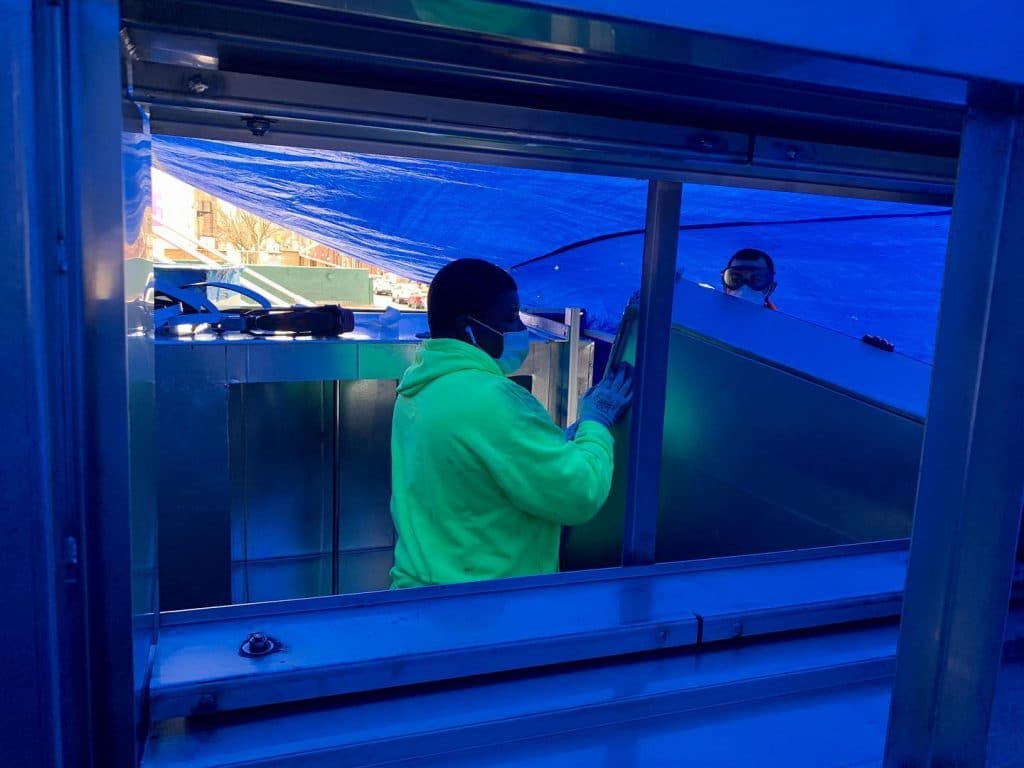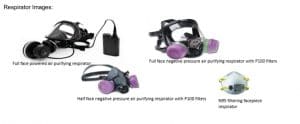

The new national framework outlines planning and implementation elements with strong minimum standards, screening policies and the requirement of a comprehensive employer exposure control plan comprised of control measures, symptom checking, social distancing, training, hygiene and decontamination procedures.
To implement a COVID-19 exposure control plan, employers should:
– Designate a site-specific COVID-19 officer at every job site.
– Plan for office staff to have the ability to work from home.
– Training: Train workers with the most recent information on the hazard and control measures, including social distancing, handwashing facilities on site, and how high-touch surfaces are disinfected.
– Screening: Ask workers to self-identify symptoms of fever, coughing, shortness of breath, chills, muscle pain, headache, sore throat, and new loss of taste or smell each day, before the shift, mid-shift, and at home.
– Screen all workers for fever at the beginning of shifts and when they become ill on the job.
– Thermometers must be ‘no touch’ or ‘no contact.’
– Workers with COVID-19 and other workers who have had close contact with those workers should be put on sick leave. Local health departments should be notified. The area where the
sick person worked should be immediately disinfected.
– Ensure affected workers receive paid sick leave as required under the Families First Coronavirus Response Act (FFCRA). The U.S. Department of Labor’s poster about paid sick
leave under the FFCRA should be posted at the workplace. A copy can be found here.
Social distancing: Implement social distancing procedures:
– Create at least 6 feet of space between workers by staging/staggering crews.
– Modify work schedules to stagger work, provide alternating workdays or extra shifts to reduce the total number of employees on a job site at any given time to ensure physical distancing. The
recommendation for shifting individual employees should be at the sole discretion of the Local Business Manager or their Representative.
– Identify choke points where workers are forced to stand together, such as hallways, hoists and elevators, ingress and egress points, break areas, and buses, and put in place policies to
maintain social distancing.
– In elevators and personnel hoists, ensure six feet distance between passengers in all directions and equip operator with appropriate respirator and other personal protective equipment.
– Minimize interactions when picking up or delivering equipment or materials. Organize the placement of materials to minimize movement on the work site.
Decontamination:
– Clean and disinfect high-touch surfaces on job sites and in offices—such as shared tools, machines, vehicles and other equipment, handrails, doorknobs, and portable toilets—frequently,
per CDC guidelines.
– Make disinfectants available to workers throughout the worksite and ensure supplies are frequently replenished.
– Personal hygiene: Provide soap and running water whenever possible on all job sites for frequent handwashing. If it is not possible to provide running water, disclose the reasons to your workers.
Provide alcohol-based hand sanitizers with greater than 60% ethanol or 70% isopropanol as a backup only if providing running water is impossible. Encourage workers to leave their workstations to wash their hands before and after going to the bathroom, before eating, and after coughing, sneezing, or blowing their nose.
Respiratory protection:
If workers need to be near each other to perform tasks or when working in close quarters, such as confined space work, they should wear a NIOSH-approved respirator implemented under a full respiratory protection program. NIOSH-approved respirators include filtering facepiece and elastomeric negative or positive pressure half or full facepiece respirators equipped with
N95, N99, N100, R95, P95, P99, or P100 filters.
– Cloth face coverings are not respirators and do not replace physical distancing or respirators required when workers are in close proximity. However, cloth face coverings should be provided
in other circumstances when required or recommended by state or local governments.
• Work in healthcare facilities:
If you work in healthcare facilities, train your workers in Infection Control Risk Assessment (ICRA). For information on CPWR’s ICRA training program, visit here.
In response to the construction industry’s questions regarding the COVID-19 outbreak, the following are steps workers should be taking now:
• Don’t go to work if you are feeling sick.
• Don’t go to work if you have a fever.
• Don’t go to work if you have a cough or shortness of breath.
• Avoid contact with sick people.
• Don’t shake hands when greeting others.
• Avoid large gatherings or meetings of 10 people or more.
• Stay at least 6 feet away from others on job sites and in gatherings, meetings, and training sessions.
• Cover your mouth and nose with tissues if you cough or sneeze or do so into your elbow.
• Avoid touching your eyes, nose, or mouth with unwashed hands.
• Clean your hands often by washing them with soap and water for at least 20 seconds. When hand washing isn’t available, use an alcohol-based hand sanitizer with greater than 60% ethanol or 70% isopropanol. Soap and water should be used if hands are visibly dirty.
• Clean your hands frequently, including before and after going to the bathroom, before eating, and after coughing, sneezing, or blowing your nose.
• Bring food and water bottles from home to the job site and do not share.
• Drive to worksites or parking areas by yourself—no passengers or carpooling.
• Disinfect interiors and door handles of machines or construction vehicles, and the handles of equipment and tools that are shared following employer’s COVID-19 exposure control plan.
Special guidance for older workers and people with underlying health conditions:
• Older adults and those with underlying health conditions like heart disease, diabetes, and lung disease and those with compromised immune systems (such as lupus, rheumatoid arthritis, cancer therapy) are more at risk of becoming very sick from COVID-19. CDC has additional recommendations for these individuals at the link below:
o https://www.cdc.gov/coronavirus/2019-ncov/specific-groups/high-risk-complications.html.
Additional links from federal government sources:
• OSHA: https://www.osha.gov/SLTC/covid-19/
• NIOSH: https://www.cdc.gov/niosh/emres/2019_ncov.html
• CDC: https://www.cdc.gov/coronavirus/2019-ncov/index.html
• CDC for Employers about getting their businesses ready:
https://www.cdc.gov/coronavirus/2019-ncov/specific-groups/guidance-business-response.html
Please be aware that people are vulnerable in these uncertain times. If a colleague or coworker needs mental health or substance use care, they should contact their member assistance program, employee assistance program, or the National Suicide Prevention Lifeline: 1-800-273-TALK (8255) https://suicidepreventionlifeline.org or the SMOHIT Helpline at 1-800-662-HELP (4357)
Related News
- Make sure your voice is heard, update your contact information
- SMART statement on Kilmar Armando Abrego Garcia’s right to due process
- Union leaders, community supporters to rally Friday, April 4, in support of Kilmar Armando Abrego Garcia and family
- New CSX conductor improvises to save a life
- SMART stands with Kilmar Armando Abrego Garcia
- Minnesota sheet metal worker: “I’m proud to be union”
- SMART News: Protecting Railroad Retirees’ Future
- More Than a Story: SMART-TD’s Women’s History Month Highlights Legacies in the Making
- SMART condemns executive order undermining collective bargaining rights
- Tentative Agreement Reached in Boston
